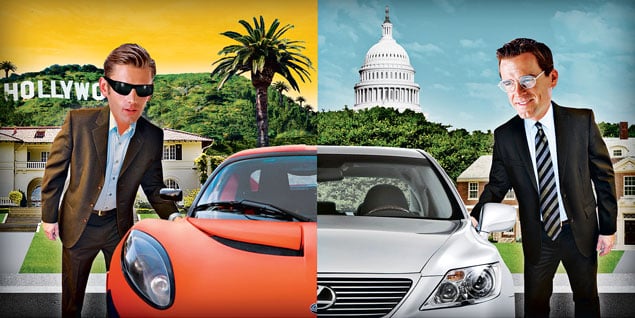The recession has relaxed its vice grip on the economy, and many people are getting back to business as usual—which means splurging with abandon, but only in the savviest of ways. Washingtonians, after all, tend to pride themselves on being smart shoppers, even when they have the means not to be.
If a Washington woman wants a new Prada bag, which can retail for $3,000 or more, she might wait for the Saks Friends and Family Sale, which offers 25 percent off many items, says Alison Lukes Teer, a personal stylist in DC: “Many of my clients know when events like that are happening. They take notes and then wait for the sale.”
Likewise, a family might pay as much as $15,000 to rent an oceanfront Bethany Beach house for a week and then stop at the outlets on the way home to get discounts on name brands such as Under Armour, Polo Ralph Lauren, and Kate Spade, says Greg Popera, a private-wealth adviser at Merrill Lynch Wealth Management in DC.
“Wealthy clients don’t show the amount of wealth they have. They live frugally. They might not have the nicest car,” Popera says, a choice he attributes partly to the desire to live in an environmentally friendly way.
When Ron Rubin, a managing principal at Bridgewater Wealth & Financial Management in Bethesda, shopped at a high-end men’s store in Los Angeles and then wore his new suit in Washington, he felt like he didn’t fit in. One of his clients sold his Porsche Carrera because he was self-conscious driving it around DC. “In LA, a Porsche Carrera is like a Honda Civic,” Rubin says. “DC is more conservative. You don’t want to be as showy as maybe you’d feel comfortable being in New York City.”
That’s not to say Washingtonians don’t like nice things—they just define the term a little differently. People here tend to choose classic St. John over high-fashion Stella McCartney, Lexus and BMW over a Lotus or Lamborghini, says Keri Hughes, vice president and senior wealth planner at the PNC Financial Services Group.
“Washingtonians are more understated in their style,” says Pamela Sorensen, founder of the website Pamela’s Punch, where she covers the local social scene. “Being flashy or ostentatious is frowned upon.” She attributes this attitude to Washington’s history as a more Southern than Northern city—Southerners feel it’s “tacky” to show off—as well as to its large military and government populations, neither of which tends to emphasize fashion.
Rita Cheng, CEO of Blue Ocean Global Wealth, says she’d feel guilty splurging on a Chanel purse—which starts around $2,200—but she’s comfortable picking up a $27 Chanel nail polish. Likewise, one of her clients loves Tiffany jewelry, but instead of springing for fancy gems, she picked up a pair of Tiffany sunglasses—$210 and up—which she wears every day.
• • •
With the recession still in their rearview mirror, Washingtonians seem to be taking a measured approach to indulgences in the new year. Here’s how local financial advisers say the smart ones will likely spend their money in 2014:
The future, with tax advantages. Retirement and college savings are top priorities for Washingtonians, according to Stacy Bakri of the Family Firm in Bethesda. She recommends saving money in both pretax and taxable accounts to avoid having to dip into pretax retirement reserves right away. “Particularly for clients in their sixties, who probably don’t have a pension, it’s great to have savings that let them delay dipping into retirement accounts,” she says. Bakri also encourages clients to start putting money away for kids’ college educations, either in a tax-advantaged 529 plan or a regular investment account that offers low expense ratios and administration costs.
Once-in-a-lifetime experiences, minus the debt. Splurging on family trips is a popular choice among wealthy Washingtonians. “We work with a family who set aside a substantial amount to spend a year traveling around the world with their elementary-school-age children and homeschooling them in each country,” Popera says. Other ideas include trekking to Mount Everest’s base camp or visiting exclusive resorts in exotic locations, all with the goal of creating lasting memories.
At the same time, more clients are opting against buying vacation homes, Rubin says: “People have lived through a few downturns in the market, and even where it might make financial sense to take on debt with a second home, people are more inclined not to do that.” Instead, they’ll opt to rent. Similarly, more clients are turning in their NetJets cards, which buy them private air travel, and instead flying commercial.
Luxury used cars. Washingtonians might like nice cars, but they aren’t necessarily buying new. “I’ve seen wealthy people buy the car they want, but they buy it two to three years old. It saves you a ton of money. Instead of a Suburban that would be 50-grand, it might be $35,000,” says Tommy Gletner, a local financial adviser at SunTrust Investment Services.
Hobbies with an entrepreneurial twist. When people pour their time into expensive hobbies, they increasingly look for ways to turn a profit on them. “People are taking things they love and making them into their side business,” Hughes says. One of her antiques-loving clients started a refurbishment business and now earns money from what used to be an expensive pursuit.
That makes it easy to indulge in your pleasure without draining the bank account.
Kimberly Palmer is author of The Economy of You: Discover Your Inner Entrepreneur and Recession-Proof Your Life. Her website is bykimberlypalmer.com.
This article appears in the January 2014 issue of Washingtonian.


















